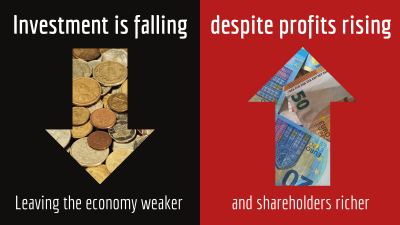‘Asset-stripping’ CEOs are weakening Europe’s economy by failing to reinvest increased profits, an analysis of Eurostat data by the European Trade Union Confederation has found.
Since the pandemic, corporations across the EU have grown their profits in real terms and increased their profit share of GDP by 4 per cent. But, at the same time, the gross investment rate has fallen by 5 per cent across Europe.
The trend is replicated in 11 member states, with the most extreme differences coming in Ireland, where investment has fallen by 63 per cent despite profit share growing by 6 per cent, and Denmark, where investment has fallen by 7 per cent despite profit share increasing by 15 per cent.
Instead of reinvesting, corporations have distributed increased profits to shareholders through record dividend payments which have risen by up to 95% across Europe since last year.
|
|
Change in gross profit share since 2019
|
Change in gross investment rate since 2019 |
|
Denmark |
+15 |
-7 |
|
Netherlands |
+8 |
-6 |
|
Germany |
+6 |
0 |
|
Ireland |
+6 |
-63 |
|
Poland |
+6 |
-21 |
|
Belgium |
+5 |
-2 |
|
Czechia |
+5 |
-1 |
|
Croatia |
+5 |
-11 |
|
Luxembourg |
+5 |
-11 |
|
Latvia |
+4 |
-1 |
|
Slovenia |
+2 |
0 |
|
Euro zone |
+3 |
-5 |
|
EU |
+4 |
-5 |
The increase in profit share automatically means that the share of income allocated to wages is lower (taxes on production aside), further increasing income inequality between the boardroom and the shop floor.
The value of workers’ existing wages is also falling due to inflation, which according to European Central Bank data, is being driven primarily by increased corporate profit margins.
The failure to reinvest profits will also damage productivity, mean that fewer jobs will be created and leave companies ill prepared for a future downturn in the economy.
The ETUC is calling on European and national policymakers to restore corporate responsibility by:
- Imposing windfall taxes on the excess corporate profits.
- Support for collective bargaining at national and sectoral levels by ensuring only companies who set pay and conditions in negotiations with trade unions can receive public money.
- Putting social conditions on public money which require companies to prioritise the creation of quality jobs, instead of simply redirecting it to increase dividends.
Commenting on the findings, ETUC General Secretary Esther Lynch said:
“These figures show there has been a complete breakdown in any sense of corporate responsibility in Europe’s boardrooms. Bosses are quietly asset-stripping our economy.
“Companies have taken advantage of supply problems caused by the pandemic and the war in Ukraine to unduly increase their profit margins.
“Instead of reinvesting in productivity or creating new jobs, CEOs have simply siphoned the profits out of the economy and into the, often offshore, accounts of already wealthy shareholders.
“CEOs are failing in their responsibility to fix the roof while the sun is shining, leaving companies at a greater risk of collapse if a recession hits next year as a result of the ECB’s record interest rate hikes.
“Meanwhile workers are receiving a smaller share of the wealth they are creating despite facing increased prices.
“European and national leaders need to stop the hollowing out of our economy and back collective bargaining as the best way to restore some balance between boardrooms and workers.”
Notes
Source for investment and profit figures: https://ec.europa.eu/eurostat/databrowser/view/NASA_10_KI__custom_7493729/default/table?lang=en

